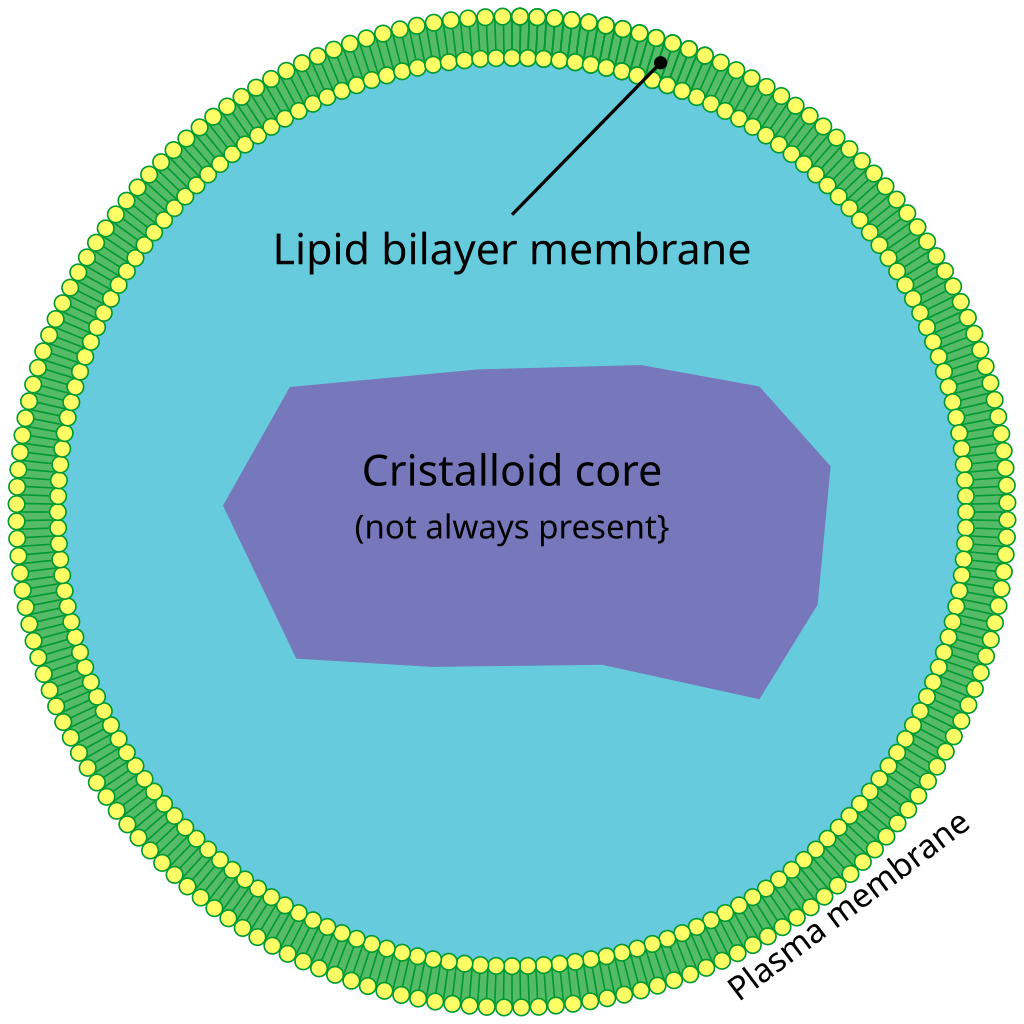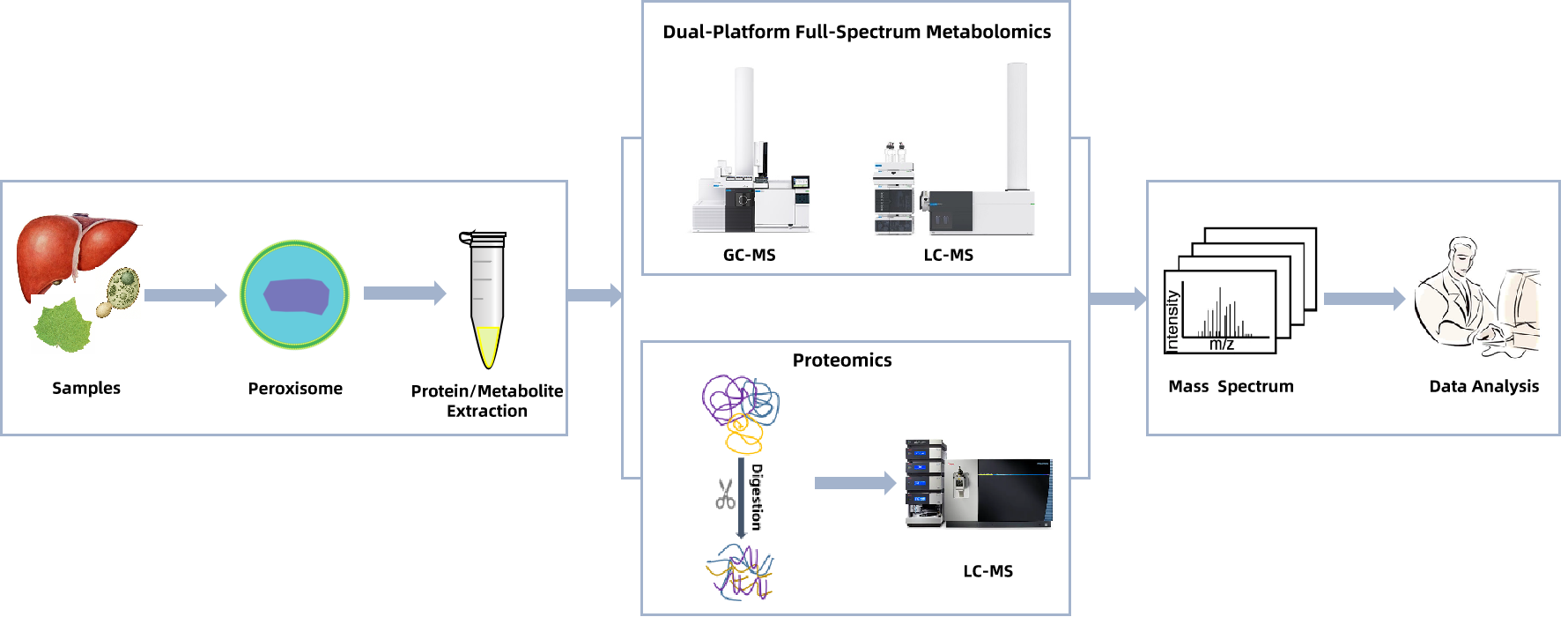Peroxisome Analysis Services
- Global profiling of peroxisomal membrane and matrix proteins
- Identification of post-translational modifications (PTMs) such as phosphorylation, acetylation, and ubiquitination
- Mapping of protein–protein interaction networks (PPI) through affinity-based enrichment or database-supported modeling
- Sub-organelle localization and protein distribution analysis
- Targeted and untargeted analysis of peroxisomal metabolites, including fatty acid derivatives, H₂O₂, aldehydes, and other redox-related compounds
- Metabolic pathway enrichment and comparative analysis across treatment or disease conditions
- Characterization of peroxisomal membrane lipid composition and remodeling events
- Quantification of key intermediates in lipid metabolism, including long-chain acyl-CoAs and phospholipid precursors
Peroxisomes are single-membrane-bound organelles widely present in eukaryotic cells, characterized by high enzymatic variability and enrichment of oxidases and antioxidant enzymes. Their functions are highly dynamic and context-dependent, varying significantly across cell types, developmental stages, and physiological conditions. In mammalian cells, peroxisomes play essential roles in fatty acid β-oxidation, H₂O₂ metabolism, cholesterol biosynthesis, and alcohol detoxification. In plants, glyoxysomes facilitate the conversion of storage lipids to carbohydrates and regulate photorespiration. In yeast, peroxisome abundance and activity adapt to changing carbon sources to meet metabolic demands.
Functionally, peroxisomes are indispensable for maintaining redox homeostasis, mediating metabolite trafficking, and orchestrating cellular stress responses. Dysregulation of peroxisomal function has been implicated in a broad spectrum of diseases, including neurodegeneration, metabolic syndromes, immune dysfunction, and aging. Therefore, comprehensive multi-omics profiling of peroxisomes offers critical insights into cellular health, disease mechanisms, and therapeutic target discovery.

Figure 1. The Basic Structure of Peroxisomes
MtoZ Biolabs offers comprehensive Peroxisome Analysis Services that integrate high-resolution mass spectrometry with multi-omics strategies such as proteomics, metabolomics and lipidomics and are further supported by advanced bioinformatics. These services enable in-depth molecular investigation of peroxisome biology under both physiological and pathological conditions, driving discoveries in systems cell biology, precision medicine and metabolic research.
Services at MtoZ Biolabs
MtoZ Biolabs offers Peroxisome Analysis Services across multiple analytical dimensions—from structural isolation to functional interpretation. Services include:
· Peroxisome Isolation and Purification Service
Optimized differential centrifugation and density gradient-based workflows for isolating intact peroxisomes from mammalian, plant, or microbial sources. Organelle integrity is confirmed using marker proteins such as Catalase or PEX family members.
· Peroxisome Proteomics Services
· Peroxisome Metabolomics Services
· Peroxisome Lipidomics Services
Analysis Workflow
1. Sample Intake & Preprocessing Guidance
Submission of fresh/frozen tissue, cultured cells, or microbial pellets. We assess storage conditions and offer personalized lysis and preparation protocols.
2. Organelle Extraction & Purity Assessment
High-yield isolation of peroxisomes via centrifugation or commercial kits, validated through immunodetection of marker enzymes and subcellular prediction tools.
3. Mass Spectrometry Acquisition
Sample profiling via Thermo Orbitrap, Q Exactive HF, or Agilent Q-TOF platforms integrated with Nano-LC systems for high sensitivity and broad dynamic range.
4. Multi-Omics Data Analysis
Bioinformatics workflows include differential expression analysis, pathway enrichment, network modeling, subcellular prediction, and integrative multi-omics interpretation.

With this end-to-end workflow, our Peroxisome Analysis Services ensure high data quality, consistency, and biological relevance across a range of experimental conditions.
Why Choose MtoZ Biolabs?
✔ State-of-the-Art Instrumentation: Thermo and Agilent high-resolution MS platforms combined with Nano-LC enable precise, high-throughput omics profiling.
✔ Cross-Species Sample Compatibility: Supports sample types from animal tissues, plant materials, yeast, and various microbes, enabling translational and model-organism studies.
✔ High-Purity Organelle Extraction: Efficient, reproducible isolation of peroxisomes compatible with multi-omics integration.
✔ Comprehensive Bioinformatics Pipeline: From raw data preprocessing to functional annotation and network biology analysis, we deliver end-to-end informatics support.
✔ Tailored Project Design: Flexible study designs and analytical approaches aligned with research goals, including disease modeling, drug efficacy evaluation, and target discovery.
Sample Submission Suggestions
|
Sample Type |
Recommended Amount |
|
Animal or Plant Tissues |
≥ 100 mg (fresh or flash-frozen) |
|
Cell |
≥ 1 × 10⁷ cells or equivalent lysate |
|
Isolated Peroxisomes |
≥ 30 μg protein or quantifiable metabolites |
|
Yeast / Microbial Pellets |
≥ 500 OD₆₀₀ units |
Note: Avoid lysis buffers containing SDS, high salt concentrations, glycerol, or chelators. Samples should be snap-frozen and shipped on dry ice. Please consult our technical team in advance to confirm sample compatibility.
FAQ
Q1: How do you confirm that the extracted fraction contains peroxisomes?
We use Western blotting to detect canonical peroxisomal markers (e.g., Catalase, PEX proteins), combined with subcellular localization prediction and mass spectrometry-based database validation.
Q2: Can you analyze peroxisomes under disease or treatment conditions?
Yes. We support custom study designs incorporating disease models (e.g., oxidative stress, knockout animals, drug treatment) and provide multi-omics solutions for functional characterization.
Q3: Can I choose only one type of omics analysis?
Absolutely. Our modular service structure allows you to opt for proteomics, metabolomics, or lipidomics independently—or as an integrated multi-omics package.
What Could be Included in the Report?
1. Comprehensive Experimental Details
2. Materials, Instruments, and Methods
3. Total Ion Chromatogram & Quality Control Assessment
4. Data Analysis, Preprocessing, and Estimation
5. Bioinformatics Analysis
6. Raw Data Files
Peroxisomes are central regulators of lipid metabolism, redox balance, and cellular homeostasis. Our Peroxisome Analysis Services offer valuable insights for biomedical research, drug development, and systems-level metabolic engineering.
At MtoZ Biolabs, we are committed to advancing organelle-level systems biology. Through expert Peroxisome Analysis Services, alongside profiling solutions for mitochondria, ER, Golgi, lysosomes, and nuclei, we empower life science discoveries from bench to bedside.
Contact us today to explore how we can support your next discovery.
Related Services
Mitochondrial Analysis Services
How to order?







